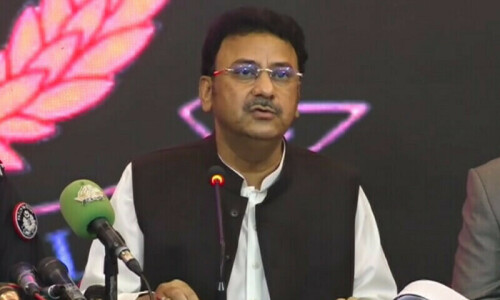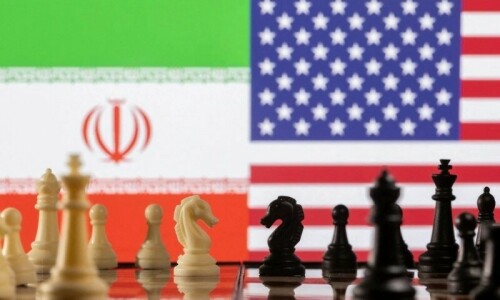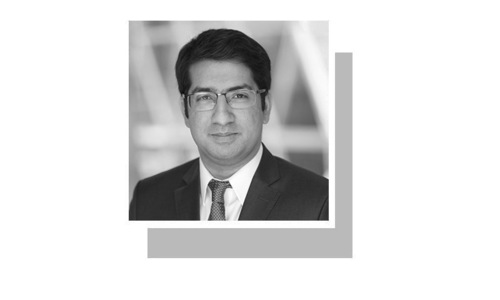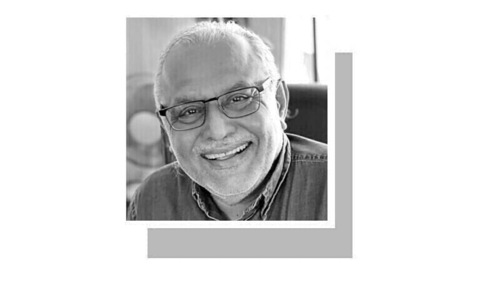ISLAMABAD: Supreme Court Justice Jamal Khan Mandokhail on Wednesday expressed surprise at an apparent anomaly in the Pakistan Army Act 1952 (PAA), observing that despite the presence of Sections 2(1)(d)(i) and (ii) that allowed the court martial of civilians, terrorists involved in crimes such as kidnapping a soldier for ransom, would still not face a military trial.
Justice Mandokhail made these remarks as the seven-member Constitutional Bench took up the intra-court appeals against the Oct 23, 2023 judgement that nullified the military trials of civilians accused of involvement in the May 9 violence.
Sections 2(1)d(i) and 2(1)(d)(ii) of the Pakistan Army Act allow the court martial of civilians otherwise not subject to the act if they are accused of seducing or attempting to seduce any army officer from duty or allegiance to the government or committed offence in relation to any work of defence, arsenal, military establishment or station etc.
In its Oct 23 judgment, the five-judge Supreme Court had declared these sections as ultra vires of the Constitution.
During the hearing, Justice Mandokhail questioned whether any nexus existed when terrorists attacked the Peshawar Army Public School (APS) in 2014 and questioned why their cases were never tried in military courts despite Sections 2(1)(d)(i) and (ii).
Justice Mandokhail wonders terrorists involved in violence against army men not liable to face military justice
Justice Mandokhail also alluded to a query previously raised by Justice Syed Hasan Azhar Rizvi, who questioned why the perpetrators of the 2009 GHQ attack or the 2011 PNS Mehran Naval headquarters attack — in which even sophisticated surveillance aircraft were destroyed — were not tried in military courts, but noted that the answer to this question lied in the 21st Amendment to the Constitution.
Justice Rizvi brought up a recent incident in which terrorists kidnapped 17 individuals, later releasing eight of them, and highlighted instances wherein certain army officers were freed following negotiations.
Khawaja Haris Ahmed, who represented the defence ministry, stated that at the time of the APS attack, the nexus was absolutely there, while also conceding that the army act and the Official Secrets Act (OSA) were in place at the time of this tragedy.
Justice Naeem Akhtar Afghan, while pointing towards the senior counsel, said that we also have to consider the intention of the legislator behind the 21st Amendment under which military courts were established with a sunset clause of two years.
Justice Rizvi, without naming anyone, referred to former Senate chairman Raza Rabbani who had signed the amendment with tears in his eyes.
“Perhaps he realised what the parliamentarians were doing, but felt his hands were tied,” Justice Mandokhail remarked. He added the Senate chairman would merely have risked his position had he resisted the amendment.
Khawaja Haris, however, replied that he would not comment on the issue since he respected him a lot for his great contribution to parliament.
Referring to Article 8(3)(a) of the Constitution, the counsel explained that no challenge to any trial before the military court could be raised under Article 184(3) of the Constitution on the touchstone of fundamental rights.
The counsel also cited the 2015 amendment in Section 2(1)(d)(iii) that stated any person who belongs to or supports a terrorist group and commits certain acts is subject to punishment under the Pakistan Army Act. At this, Justice Mandokhail reiterated that such terrorists or groups would not be tried by the military courts even today.
That’s why the 21st Amendment was introduced so that no challenge could be instituted on the basis of the fundamental rights, the counsel said, adding whatever came under Article 8(3) of the Constitution would be protected from any challenge under the fundamental rights.
The counsel argued that the nature of the crime determined where the trial would go, adding if the civilians were involved in crimes related to the armed forces, the military court would try such civilians.
Procedure for trials Justice Muhammad Ali Mazhar asked the counsel about a comparative study highlighting what procedure was adopted for the military trials, adding the court has to examine whether the accused facing military trial had access to a lawyer of their choice and whether the evidence was provided.
The counsel contended that in case the Supreme Court declared sections 2(1)(d)Ii) and (ii) of the PAA as valid law under the touchstone of Article 8(3), then the petitions challenging trials of the civilians by the military courts would have to be declared inadmissible and not maintainable.
In a lighter vein at the fag end of the proceedings, senior counsel Faisal Siddiqi said that after hearing the arguments of Khawaja Haris, the lawyers were thinking of starting practising in military courts.
At this, Justice Mazhar observed let the court decide the matter and then whoever would like to practise, go and do it.
Published in Dawn, January 16th, 2025
















































Dear visitor, the comments section is undergoing an overhaul and will return soon.